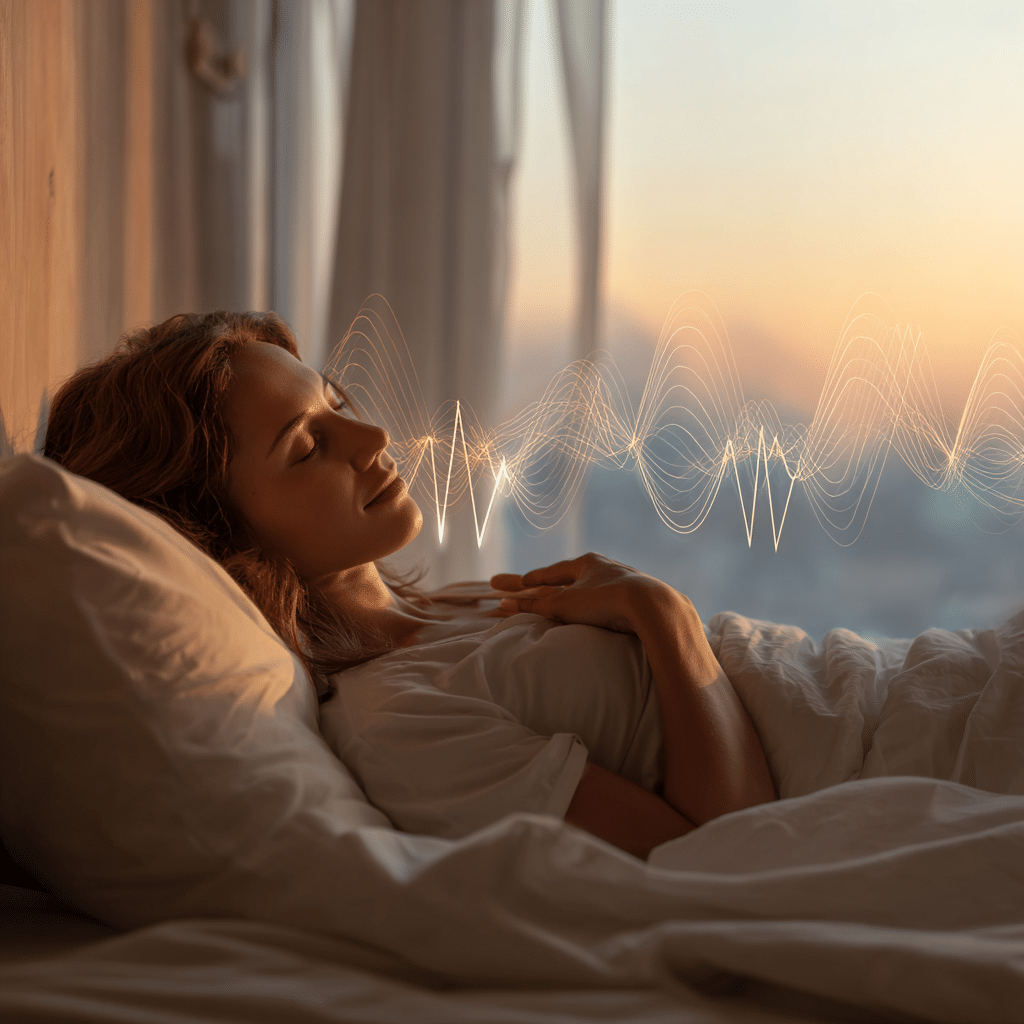Reducing Cardiovascular Stress Through Anxiety Management: The Sleep Connection

The emerging science of reducing cardiovascular stress through anxiety management offers unprecedented hope for millions struggling with the intersection of mental health and heart disease.
Recent technological advances, from AI-driven relaxation tools to mindfulness programs, are providing new avenues for addressing sleep anxiety while prioritizing psychological well-being over rigid sleep goals.
Story-at-a-Glance
• Sleep irregularity in anxious individuals creates a dangerous cascade affecting heart health through oxidative stress, impaired blood vessel function, and disrupted blood pressure control—with recent 2025 research showing irregular sleep patterns pose greater cardiovascular risk than poor sleep quality alone
• The anxiety-sleep-heart triangle forms a vicious cycle where anxiety disrupts sleep, poor sleep increases cardiovascular stress, and heart concerns fuel more anxiety, creating a self-perpetuating pattern that requires targeted intervention
• Managing anxiety to reduce heart stress through better sleep involves evidence-based approaches including cognitive behavioral therapy for insomnia (CBT-I), sleep hygiene optimization, and stress reduction techniques that address the root emotional causes
• Recent clinical findings reveal anxiety management significantly improves cardiovascular outcomes when combined with sleep interventions, with studies showing reduced blood pressure, improved heart rate variability, and decreased inflammatory markers
• Practical sleep-focused anxiety management strategies can break the destructive cycle, offering hope for millions struggling with the intersection of mental health and cardiovascular disease
The Hidden Connection: When Anxiety Hijacks Your Heart Through Sleep
Sarah, a 34-year-old marketing executive, started experiencing chest tightness and heart palpitations during her company’s demanding restructuring period. Her doctor’s initial assessment showed normal cardiac function, but recent groundbreaking research from Virginia Commonwealth University has revealed a troubling connection: chronic anxiety disrupts sleep patterns in ways that directly threaten cardiovascular health through mechanisms like oxidative stress, vascular dysfunction, and poor blood pressure control.
This emerging understanding of reducing cardiovascular stress through anxiety management represents a paradigm shift in how we approach heart health. Rather than treating sleep, anxiety, and cardiovascular concerns as separate issues, researchers are now documenting how these systems interweave in complex, bidirectional relationships that demand integrated solutions.
The Virginia Commonwealth University study, published in 2025, examined young adults with chronic anxiety and made a startling discovery: it wasn’t just poor sleep quality that endangered their hearts—irregular sleep timing proved even more devastating to cardiovascular health. This research fundamentally changes our approach to managing anxiety to reduce heart stress.
The Cardiovascular Consequences of Anxious Sleep
When Your Sleep Schedule Becomes a Heart Risk Factor
Twenty-eight young participants with generalized anxiety disorder underwent comprehensive sleep and cardiovascular assessment for seven consecutive days. The results were striking: irregular total sleep time was significantly associated with higher oxidative stress, lower brachial artery function, and diminished blood pressure control—key precursors to cardiovascular disease.
Dr. Jacob Richardson, the study’s lead author, noted something unexpected. “We found that irregular TST in individuals with chronic anxiety was significantly associated with higher oxidative stress, lower brachial artery function, and blunted blood pressure control,” he explained. These findings suggest that managing anxiety to reduce heart stress requires attention not just to sleep quantity or quality, but to sleep consistency.
The Biological Cascade: From Racing Thoughts to Racing Hearts
According to the National Heart, Lung, and Blood Institute’s 2024 workshop, disrupted sleep increases stress and is strongly associated with depression and anxiety, all of which exacerbate cardiovascular risk through increased inflammation, altered heart rate variability, and higher levels of stress hormones like cortisol.
This creates what researchers call the “anxiety-sleep-cardiovascular triangle”—a self-reinforcing cycle where:
- Anxiety disrupts sleep patterns through racing thoughts, muscle tension, and hypervigilance
- Poor sleep quality increases cardiovascular stress via inflammatory pathways and autonomic nervous system dysfunction
- Cardiovascular symptoms fuel more anxiety about health, creating anticipatory worry that further disrupts sleep
A 2024 study published in Frontiers in Psychiatry found that sleep disturbance mediates the relationship between depression and cardiovascular disease, suggesting that addressing sleep issues could break this destructive cycle.
Clinical Evidence: Real Patients, Real Outcomes
Consider the case of Michael, a 42-year-old teacher who participated in a recent multicenter study on cardiovascular recovery. Following cardiothoracic surgery, Michael experienced significant anxiety and sleep disturbances during his ICU stay. Researchers implemented a comprehensive psychological care pathway integrating cognitive behavioral therapy for insomnia (CBT-I) strategies, environmental optimization, and targeted interventions.
The results demonstrated the power of reducing cardiovascular stress through anxiety management: patients receiving the integrated intervention showed improved sleep quality, reduced anxiety levels, shorter ICU stays, and fewer complications compared to standard care.
The Science Behind Sleep-Focused Anxiety Management
Understanding Sleep Reactivity in Anxious Hearts
Recent research has identified “sleep reactivity”—the degree to which stress disrupts sleep—as a crucial vulnerability factor. Individuals with high sleep reactivity show exaggerated neurobiological and cognitive-emotional responses to stress that specifically impact sleep regulation. This discovery helps explain why some people’s cardiovascular health suffers more dramatically during anxious periods.
Dr. Neomi Shah, Associate Dean for Faculty Career Advancement at Mount Sinai’s Icahn School of Medicine, is pioneering research in this area. “Our work stands at the intersection of cutting-edge artificial intelligence and sleep medicine,” Dr. Shah explains. “We’re developing machine-learning models to identify cardiovascular disease risk in patients with sleep disorders, epitomizing our collaborative effort to both enrich our understanding and improve patient care”.
The Hormonal Highway: How Anxiety Travels to Your Heart
When anxiety strikes at bedtime, your body doesn’t simply “turn off” stress responses because you’ve laid down. Laboratory studies show that sleep deprivation in normotensive adults leads to elevated heart rate and blunted day-to-night blood pressure dipping—a pattern associated with increased cardiovascular risk.
The mechanism involves several pathways:
- Cortisol dysregulation keeps the body in “high alert” mode
- Sympathetic nervous system activation increases heart rate and blood pressure
- Inflammatory marker elevation damages blood vessels over time
- Heart rate variability reduction indicates poor cardiovascular adaptability
This scientific understanding transforms how we approach cardiovascular health—it’s not enough to tell anxious patients to “just relax.” We need targeted strategies for managing anxiety to reduce heart stress through improved sleep.
Breaking the Cycle: Evidence-Based Interventions
Cognitive Behavioral Therapy for Insomnia: The Gold Standard
CBT-I addresses the root emotional causes of sleep disruption, teaching patients to identify and change stress-related habits that perpetuate the anxiety-sleep-cardiovascular cycle. This approach goes beyond sleep hygiene to tackle the cognitive patterns that keep minds racing at bedtime.
Research demonstrates that individuals who learn to schedule “worry time” earlier in the evening and practice progressive muscle relaxation can break the cycle of reducing cardiovascular stress through anxiety management.
Environmental Optimization: Your Bedroom as Medicine
Clinical studies show that environmental optimization combined with psychological interventions significantly improves outcomes for patients with anxiety-related sleep and cardiovascular issues. This involves:
- Temperature regulation (optimal range 65-68°F)
- Light exposure management including blue light reduction 2 hours before bedtime
- Sound masking to prevent anxiety-inducing disruptions
- Comfort optimization with supportive bedding and ergonomic positioning
The Power of Consistency: Sleep Scheduling for Heart Health
Given the 2025 research showing irregular sleep timing poses greater cardiovascular risk than poor sleep quality, consistency becomes paramount. The Virginia Commonwealth University findings suggest that maintaining regular sleep-wake cycles, even when total sleep time varies, protects against the cardiovascular damage associated with chronic anxiety.
Save This Article for Later – Get the PDF Now
Emerging Approaches and Future Directions
Technology Meets Tradition: AI-Powered Personalization
Mount Sinai researchers are developing AI-powered models using machine-learning techniques to identify cardiovascular disease risk in patients with sleep disorders and classify patients who may benefit from specific treatment approaches. This personalized medicine approach recognizes that reducing cardiovascular stress through anxiety management isn’t one-size-fits-all.
However, there’s a cautionary note here. Recent studies warn about “orthosomnia”—a growing concern where sleep-tracking devices exacerbate anxiety through obsessive monitoring of sleep metrics. The key is balancing technological insights with psychological well-being.
The Inflammation Connection: Beyond Sleep Quality
Research increasingly shows that the relationship between sleep, anxiety, and cardiovascular health involves complex inflammatory pathways and genetic factors. This understanding opens new therapeutic targets beyond traditional sleep interventions.
Dr. John Winkelman from Massachusetts General Hospital’s Sleep Disorders Clinical Research Program notes, “We’re seeing that managing anxiety to reduce heart stress requires addressing not just sleep duration or quality, but the underlying neurobiological systems that connect emotional regulation with cardiovascular function.”
Cultural and Global Perspectives
The NHLBI workshop highlighted significant racial and ethnic disparities in sleep health and cardiovascular diseases, with minoritized populations experiencing poorer sleep quality and shorter durations, particularly affecting women. This underscores the need for culturally sensitive approaches to reducing cardiovascular stress through anxiety management.
Recent research from Pakistan provides insight into global patterns. A 2025 study of 234 cardiovascular patients found anxiety and depression symptoms in 28.6% of participants, significantly higher among single participants and females. These findings emphasize the universal nature of the anxiety-sleep-cardiovascular connection while highlighting population-specific risk factors.
Practical Strategies for Immediate Implementation
The Evening Anxiety Audit
Before implementing complex interventions, try this simple assessment: For one week, note your anxiety level (1-10 scale) and sleep quality each morning. You’ll likely discover patterns that reveal how managing anxiety to reduce heart stress through better sleep can become a targeted, rather than generic, endeavor.
The 3-2-1 Bedtime Protocol
Based on recent research, consider this evidence-informed approach:
- 3 hours before bed: Last large meal and caffeine cutoff
- 2 hours before bed: Begin blue light reduction and start “worry time” journaling
- 1 hour before bed: Begin relaxation routine with deep breathing or progressive muscle relaxation
Movement as Medicine
Research shows that daytime exercise has been linked to better sleep in patients with generalized anxiety disorders, creating a positive cycle where physical activity improves sleep, which in turn reduces cardiovascular stress. Even a 10-minute evening walk can help regulate circadian rhythms while providing gentle cardiovascular conditioning.
When to Seek Professional Help
Red Flags That Require Medical Attention
While self-management strategies are valuable, certain signs indicate the need for professional intervention in reducing cardiovascular stress through anxiety management:
- Chest pain or palpitations during anxiety episodes
- Sleep disruption lasting more than two weeks
- Anxiety symptoms interfering with daily functioning
- Blood pressure changes coinciding with sleep problems
The Integrated Care Approach
The 2025 European Society of Cardiology Clinical Consensus Statement emphasizes that routine screening for mental health conditions using validated questionnaires is advised during hospitalization and follow-up for cardiovascular patients. This represents a growing recognition that effective cardiovascular care must address psychological factors.
Dr. Susan Redline, a prominent sleep researcher, advocates for this integrated approach: “We can no longer treat the heart and mind as separate entities. The evidence clearly shows that managing anxiety to reduce heart stress requires coordinated care that addresses sleep, emotional regulation, and cardiovascular risk factors simultaneously.”
Looking Forward: Hope for Healing Hearts
The emerging science of reducing cardiovascular stress through anxiety management offers unprecedented hope for millions struggling with the intersection of mental health and heart disease. Recent technological advances, from AI-driven relaxation tools to mindfulness programs, are providing new avenues for addressing sleep anxiety while prioritizing psychological well-being over rigid sleep goals.
As we continue to unravel the complex relationships between anxiety, sleep, and cardiovascular health, one thing becomes clear: the path to a healthier heart often runs through a calmer mind and more peaceful sleep. The research consistently shows that when we address the emotional foundations of sleep disruption, cardiovascular benefits naturally follow.
Whether you’re dealing with work stress like Sarah, recovering from cardiac procedures like Michael, or simply noticing that anxiety affects your sleep and heart, remember that effective interventions exist. The key lies in understanding that reducing cardiovascular stress through anxiety management isn’t about perfection—it’s about consistency, self-compassion, and evidence-based strategies that honor the intricate connections between mind, sleep, and heart.
Your journey toward better cardiovascular health through improved sleep and anxiety management begins with a single step. You must recognize that these systems are connected. Healing one can powerfully support the healing of all.
FAQ
Q: What is the connection between anxiety, sleep, and cardiovascular health?
A: Research shows that anxiety disrupts sleep patterns, which directly impacts cardiovascular health through increased oxidative stress, poor blood vessel function, and disrupted blood pressure control. This creates a vicious cycle where anxiety worsens sleep, poor sleep increases heart stress, and cardiovascular symptoms fuel more anxiety.
Q: How does irregular sleep timing affect heart health differently than poor sleep quality?
A: Recent 2025 research found that irregular sleep timing (varying when you go to bed and wake up) poses greater cardiovascular risk than poor sleep quality alone. Irregular sleep schedules were significantly associated with higher oxidative stress, reduced blood vessel function, and impaired blood pressure control in people with chronic anxiety.
Q: What does “reducing cardiovascular stress through anxiety management” mean practically?
A: This approach focuses on managing anxiety symptoms to improve sleep quality and consistency, which in turn reduces strain on the cardiovascular system. It involves evidence-based strategies like cognitive behavioral therapy for insomnia (CBT-I), sleep hygiene optimization, stress reduction techniques, and maintaining consistent sleep schedules.
Q: What is CBT-I and how does it help with cardiovascular health?
A: Cognitive Behavioral Therapy for Insomnia (CBT-I) is a structured program that helps identify and change thoughts and behaviors that interfere with sleep. By addressing the root emotional causes of sleep disruption, CBT-I breaks the cycle between anxiety and poor sleep, which reduces cardiovascular stress and improves heart health outcomes.
Q: Can technology help or harm anxiety-related sleep problems?
A: Technology can be both helpful and harmful. AI-powered tools and mindfulness apps can provide personalized interventions for managing anxiety and improving sleep. However, obsessive monitoring of sleep metrics through tracking devices can create “orthosomnia”—anxiety about sleep performance that actually worsens sleep quality.
Q: When should someone seek professional help for anxiety affecting sleep and heart health?
A: Seek professional help if you experience chest pain or heart palpitations during anxiety episodes, sleep disruption lasting more than two weeks, anxiety symptoms interfering with daily life, or blood pressure changes coinciding with sleep problems. Healthcare providers can offer integrated care addressing sleep, emotional regulation, and cardiovascular risk factors.
Q: What are some immediate strategies I can try tonight to reduce cardiovascular stress through better sleep?
A: Try the 3-2-1 bedtime protocol: Stop large meals and caffeine 3 hours before bed, begin blue light reduction and “worry time” journaling 2 hours before bed, and start relaxation routines 1 hour before bed. Maintain consistent sleep and wake times, even on weekends, and practice deep breathing or progressive muscle relaxation to calm both mind and body.
Q: Are certain groups more at risk for anxiety-related sleep and cardiovascular problems?
A: Yes, research shows significant disparities. Women, single individuals, minorities, and those with lower socioeconomic status face higher risks. Additionally, people with existing cardiovascular conditions, chronic anxiety disorders, or high “sleep reactivity” (sensitivity to stress-related sleep disruption) are more vulnerable to this dangerous cycle.
Q: What does “oxidative stress” mean and why does it matter for heart health?
A: Oxidative stress occurs when harmful molecules called “free radicals” damage cells in your body faster than your natural defenses can repair them. In the context of cardiovascular health, oxidative stress damages blood vessels and heart tissue, leading to inflammation and increasing the risk of heart disease. Poor sleep and anxiety increase oxidative stress levels.
Q: What is “brachial artery function” and why is it important?
A: The brachial artery is the major blood vessel in your upper arm that doctors often use to measure blood pressure. Brachial artery function refers to how well this artery can expand and contract to regulate blood flow. When brachial artery function is impaired, it indicates problems with blood vessel health throughout the body, which increases cardiovascular disease risk.
Q: What does “heart rate variability” (HRV) mean?
A: Heart rate variability measures the natural variation in time between heartbeats. A healthy heart doesn’t beat like a metronome—there should be slight variations that show your nervous system is properly regulating your heart. Reduced HRV indicates poor cardiovascular adaptability and is associated with increased risk of heart problems.
Q: What is “generalized anxiety disorder” (GAD)?
A: Generalized Anxiety Disorder is a mental health condition characterized by persistent, excessive worry about various aspects of life (work, health, family, finances) that is difficult to control. People with GAD often experience physical symptoms like muscle tension, fatigue, and sleep problems. It affects about 6.8 million American adults.
Q: What does “sympathetic nervous system activation” mean?
A: The sympathetic nervous system is part of your body’s “fight or flight” response. When activated by stress or anxiety, it increases heart rate, blood pressure, and stress hormone levels to prepare your body for perceived danger. Chronic activation due to ongoing anxiety and poor sleep puts excessive strain on the cardiovascular system.
Q: What are “circadian rhythms” and how do they affect heart health?
A: Circadian rhythms are your body’s internal 24-hour clock that regulates sleep-wake cycles, hormone release, and other bodily functions. These rhythms help coordinate when your heart rate and blood pressure naturally rise and fall throughout the day. Disrupted circadian rhythms from irregular sleep can lead to poor cardiovascular health.
Q: What does “sleep efficiency” mean?
A: Sleep efficiency is the percentage of time you spend actually sleeping while in bed. It’s calculated by dividing total sleep time by total time in bed, then multiplying by 100. For example, if you sleep 7 hours during 8 hours in bed, your sleep efficiency is 87.5%. Good sleep efficiency is typically 85% or higher.
Q: What is “orthosomnia”?
A: Orthosomnia is a new term describing the anxiety and sleep problems that can develop from obsessively tracking and worrying about sleep data from devices like fitness trackers or sleep apps. People with orthosomnia become so focused on achieving “perfect” sleep metrics that the worry itself actually makes their sleep worse.

